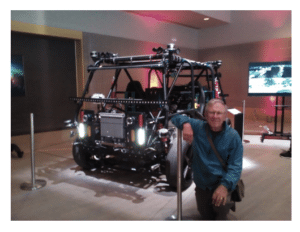
During Global Climate Action Summit Sept. 14, 2018, Bob MacDonald poses at Moscone Center with Zoox Autonomous Vehicle due to “roll out” in 2020.
About 150 “green transportation” aficionados enthusiastically welcomed keynote speaker 19th District Assembly Member Phil Ting at the second session organized by UC Davis Institute of Transportation of a transportation-focused satellite meeting of the Global Climate Action Summit in San Francisco Sept. 11, 2018. As noted by Prof. Dan Sperling, founding Director of the IT, Ting has been a champion of reducing greenhouse gases (GHG) due to transportation in the State Assembly – advocating for rebates to promote purchase of electric vehicles (eVs), for more eV charging stations, for increased ride sharing and for updated policies on Autonomous Vehicles (aVs)! Sperling spotlighted aspects of the persistent problem in questions to Ting, an eV owner, intent on encouraging a policy path to more eVs, diminishing car ownership and the hoped-for-demise of the internal combustion engine to promote shared and healthy mobility.
The event continued with 3, hour-long panel sessions with panel members speaking briefly so that questions from the audience submitted simultaneously through the App Sli.do could be addressed. Data on Sli.do showed that 20% of attendees (each paying $15 to attend–a real bargain, thanks to benefactors) were from academia, 20% from non-profits, 20% privately owned businesses and 20% from the public. Women and persons of color were under-represented in the audience but eV owners were over-represented as indicated by a show of hands – about 70% of the audience, compared with 6% statewide!
In the first panel, “What Do We Know and What Do We Need to Know about eVs, AVs and shared mobility?”, Lewis Fulton of IT predicted Greenhouse Gas emissions due to transportation would be reduced through the eventual dominance of AVs, most of which are likely to also be eVs. Ethan Elkind of UC Berkeley and UCLA Law/Energy/Environment Centers quickly covered current, specific problems facing eVs, calling for local government action to “avoid a dystopian future” for the transportation sector. And Matthew Goetz from the Georgetown Climate Center urged states to enact better regulation of AV and shared vehicles, lauding such programs in LA and Sacramento. Questions through Sli.do centered on congestion on SF streets, underfunding and, therefore, deterioration of mass transit and need to enlighten the public about eV’s.
Upping the alphabet game, the second panel chaired by Andrew Fremeier of the Bay Area Metro Center [new SF home of Metropolitan Transit Commission (MTC), Association of Bay Area Governments (ABAG), Bay Area Air Quality Management District (BAAQMD) and Bay Conservation and Development Commission (BCDC)] showcased “New Business Models for Improving Mobility Choices” from Lyft (Lia Pisanelli), Chariot (Nima Rahimi), Lime (Scott Kubly), and Evgo (Jonathan Levy). Accentuating the positive faces of Transit Network Companies (TNCs), Lyft emphasized attempts to increase its 50% market share and 50% Carbon neutral operation by recent inclusion of scooter rentals and AVs in partnership with Partnership; Chariot distanced itself from TNCs as a commuter service of mini-buses carrying 10 riders, catering to private enterprises during peak hours and featuring reduction of 1) GHGs, 2) occupied road space, 3) friction with city administrations and labor unions; bike rental company Lime touted innovations such as cell phone use of QR code to lock and unlock bikes and mass transit stops as part of 40% of Lime trips; and Evgo cited continuing growth of fast charging network miles to convenient retail locations due to partnerships with other companies all while contending with low population density areas. Answers to Sli.do questions proposed ways to increase mobility sharing – e.g., providing accommodations for disabled persons (Chariot), more bike lanes to make bikers feel safe, enhancing public awareness of eVs (~50% of people polled could NOT name an eV maker!).
Vicki Arroyo, Georgetown Climate Center and Bolt owner, chaired the final, most diverse panel on “Maximizing Climate Benefits of the 3 Revolutions” with Adam Gronius (Uber) who called for more shared instead of private use of eVs; Ellen Greenberg (Caltrans) affirming High Speed Rail as the centerpiece of California’s transportation future (contrary to indications in the press); Leslie Garrison (Zoox) which is completely redesigning eVs, AVs, and their operating platforms (check out their new models at Moscone Center!); Andrei Greenwalt (Via) newest but competitive TNC giving 40-50,000 rides/day in NYC and other cities; and Jennifer Gress (Policy Director in Mayor Darrell Steinberg’s office) proudly describing environmentally greened up transportation resources in Sacramento, thanks to Volkswagen designating it a “Green City” and underwriting many mutually synergizing programs which are impacting sectors outside of transportation like affordable housing. Sli.do questions concerned regressive tax policy on TNC rides which needs to change, more cooperation among businesses to prevent wasteful duplication of effort, application of cap-and-trade funds to High Speed Rail so rural areas aren’t neglected, crafting new government policy to encourage public sharing of rides and introduction of charging stations for multi-family dwellings in US, as exist in Europe!
The closing speaker of this event was Mitch Mitchell, Vice President of State Governmental Affairs and External Affairs of the San Diego Gas and Electric Company and the Southern California Gas Company, principal underwriters of this well planned and executed update on reducing climate threats in the transportation sector. Approval of the event was evident as attendees applauded and happily filed out of the room to gather for the subsequent celebratory reception.
All League News

